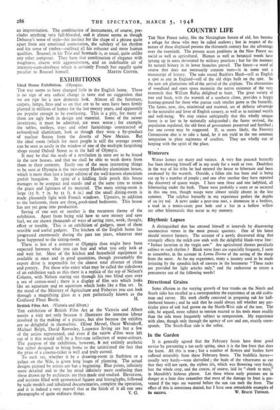COUNTRY LIFE
THE New Forest today, like the Nottingham forests of old, has become a refuge for those who may be called outlaws ; but in respect of the nature of these displaced persons the thirteenth century has the advantage over the twentieth. The present acute problems in the New Forest are social as well as agricultural. Human as well as botanical weeds have sprung up in areas devastated by military practices; but for•the moment let natural history in its lower branches prevail. The forest—a word of course that does not necessarily ' connote trees—is in some sort a manuscript of history. The oaks round Bucklers Hard—still as English a spot as any in England—tell of the old ships built on the spot. So the new ash plantations tell of the arrival of the airplane. The alternations of woodland and open space maintain the native existence of the very mammals that William Rufus delighted to hunt. The great variety of tree and bush, with the warmth of a southern clime, provides a happy hunting-ground for those who pursue such smaller game as the butterfly. The farms, now, alas, minimised and maimed, are of definite advantage to the naturalist and lover of English scenery, as well as to national wealth and well-being. We may rejoice unfeignedly that this wholly unique forest is at last to be nationally safeguarded ; the farms revived, the population regulated, the old form of government preserved and fortified ; but one caveat may be suggested. If, as seems likely, the Forestry Commission also is to take a hand, let it not yield to the too common temptation to plant regiments of conifers. They are wholly out of keeping with the spirit of the place.






























 Previous page
Previous page